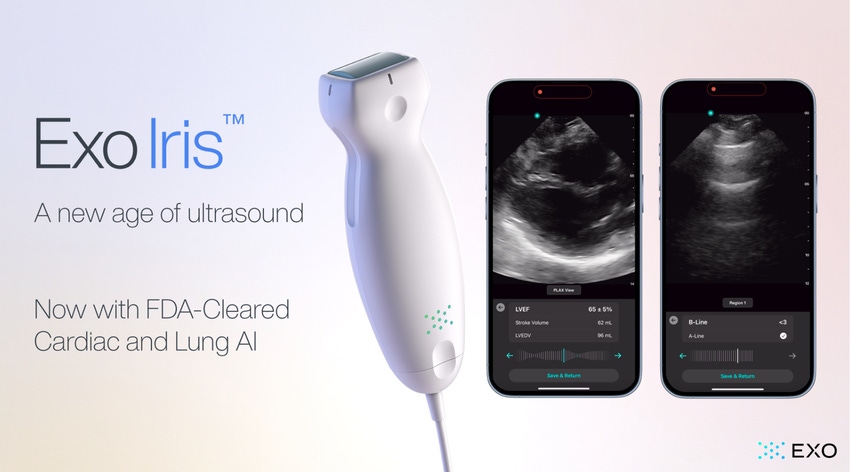Exo’s FDA Cleared Cardiac & Lung AI Now on Iris Handheld Ultrasound
With the newly approved applications, Exo is now cleared for cardiac, lung, bladder, hip, and thyroid.

Exo, a medical imaging software and device company, has announced its FDA-cleared cardiac and lung artificial intelligence (AI) applications are now available on Exo Iris, the company’s handheld ultrasound device. With the newly approved applications, Exo is cleared on cardiac, lung, bladder, hip, and thyroid.
Iris is an AI powered handheld ultrasound available at point of care, enabling health systems and caregivers — particularly in rural or underserved communities — to accelerate opportunities to diagnosis and treat patients.
"It’s time for a reimagined approach to addressing heart failure at scale,” said Sandeep Akkaraju, co-founder and CEO of Exo, in the press release. “That’s why Exo is putting AI-empowered medical imaging in the hands of every caregiver, no matter their specialty. Exo’s AI is simple to use, reproducible and objective, and will contribute to more accessible and reliable healthcare for all.”
Exo’s AI applications are trained on over 100,000 images from point of care ultrasound (POCUS) exams performed by users in real-world settings. The AI, during the clearance process, was also validated across various patient populations, health conditions, and diagnostic scan types. This means, according to the company, that it recognizes internal landmarks on even less-than-perfect scans.
For the lung AI, it can reliably identify the presence of B-lines to assess if the patient has pulmonary edema or fluid in the lungs. The cardiac AI can measure left ventricle ejection fraction and stroke volume in a few heartbeats in both parasternal long axis and apical four-chamber views. In addition to its cardiac and lung AI, Iris now features pulsed wave doppler capabilities to look at blood velocity for deeper findings in cardiac, abdominal, and vascular applications.
“Exo’s cardiac and lung AI applications are a game-changer,” said Ted Koutouzis, clinical instructor in emergency medicine at Northwestern Medicine, in the company release. “Now I have a fast and reliable clinical tool to help easily distinguish between COPD and CHF patients for precise and timely care. What’s even more exciting is how these applications open ultrasound technology to a whole new set of POCUS users, especially those with limited experience. When clinicians can perform medical imaging efficiently, it’s a win-win for both the patients we serve and the healthcare systems we work within.”
About the Author(s)
You May Also Like




